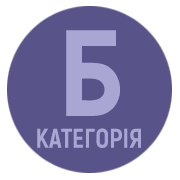FORMATION OF SPELLING COMPETENCE OF STUDENTS OF NON-PHILOLOGY SPECIALTIES IN UNIVERSITIES IN THE CONTEXT OF THE IMPLEMENTATION OF STATE LANGUAGE POLICY IN UKRAINE
DOI:
https://doi.org/10.32782/philspu/2023.4.17Keywords:
language policy of the country, criteria of language policy, spelling competence, future non-philologist specialists, forms and methods of teaching the Ukrainian language in the institutions of higher education.Abstract
The article outlines the aspects of the problem of formation of spelling and punctuation competence of students of higher education studying at non-philological faculties of Ukrainian universities. The main emphasis is on the implementation of the language policy of the state in the conditions of the war in Ukraine. The generally recognized criteria of language policy are considered through the prism of today, language legislation is characterized. The author's definitions of the concepts “language-communicative competence”, “spelling competence” are proposed. The state of coverage of the problem of formation of language-communicative competence in general and spelling competence in particular in the studies of Ukrainian scientists is analyzed. In the practical part, the results of the diagnosis of the levels of formation of the spelling competence of first-year non-philology majors conducted at the Polissia National University were reported. The radio dictation of the national unity “Roads of Ukraine”, the text of which was written by 147 winners, was chosen as the material for analysis. Examples of typical spelling errors in the works of applicants are offered and the reasons for their occurrence are clarified. The study consistently outlines effective forms and methods of optimizing the process of forming the spelling competence of firstyear students during classroom classes on business Ukrainian language and various forms of extracurricular work. The content of the educational discipline module “Business Ukrainian language”, the subject of which is Ukrainian orthography, is characterized. It is recommended to use such forms of classes as problem lectures, consultation lectures and colloquiums to study spelling norms. Preference is given to traditional written exercises and creative tasks, work with dictionaries, testing, didactic games. The expediency of using Internet resources for creating exercises is emphasized. The conclusions emphasize the flexible and rational approach of the teacher to the choice of methods and forms of education, as well as the perspective of the problem.
References
Український правопис : довідкове видання / НАН України. Київ : Наукова думка, 2019. 392 с. URL: https: // mon.gov.ua/storage/app/media/zagalna%20serednya/%202019.pdf.
Постанова Кабінету Міністрів України від 27.10.2023 № 1126 «Про внесення змін до Порядку проведення іспитів на рівень володіння державною мовою». URL: https://mova.gov.ua/.
Бацевич Ф. С. Словник термінів міжкультурної комунікації / Ф С. Бацевич / Київ : Довіра, 2007. 205 с. (Словники України).
Рускуліс Л. Методика навчання української мови у схемах, таблицях, рисунках та коментарях : навч. посіб. Миколаїв – Одеса : Видавництво ТОВ Лерадрук, 2022. 202 с.
Терещенко В. М. Методика реалізації Українського правопису в новій редакції у закладах загальної середньої освіти : навчально-методичний посібник. Харків : Соняшник, 2019. 256 с.
Карповець Х. М. Формування правописної компетентності майбутніх учителів української мови і літератури в процесі навчання мовознавчих дисциплін : дис. … канд. пед. наук: 13.00.02 – теорія та методика навчання (українська мова). Київ : Київський університет імені Бориса Грінченка, 2020. 276 с.
Вітюк В. В. Теоретико-методичні засади формування правописної компетентності в майбутніх учителів початкової школи : дис. … докт. пед. наук: 13.00.02 – теорія та методика навчання (українська мова). Київ : Київський університет імені Бориса Грінченка, 2021. 595 с.
Климова К. Я. Українська мова (за професійним спрямуванням) : навчальний посібник для здобувачів вищої освіти та викладачів-словесників. Житомир : Вид-во Поліського національного університету. 2020. 260 с.







